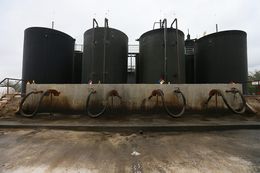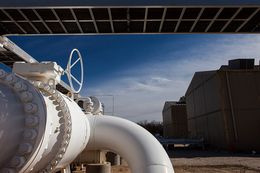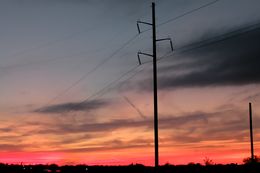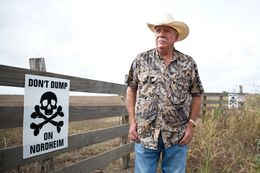Libertarian Hopeful Faults Earthquake Response Plan
Mark Miller, a Libertarian running for railroad commissioner, is no fan of the commission’s latest effort to address earthquakes possibly linked to disposal wells for oilfield waste.
Full StoryJim Malewitz covers energy for the Tribune. Before arriving, he spent two years covering energy and environmental issues for Stateline, a nonprofit news service in Washington, D.C., where his work also appeared in The Washington Post and Chicago Tribune, among other newspapers. A native of Michigan, Jim has an undergraduate degree from Grinnell College in Iowa, where he played varsity baseball. He also holds a master’s from the University of Iowa, where he helped launch the nonprofit Iowa Center for Public Affairs Journalism. Jim loves tacos and barbecue, making him a good match for Austin’s eating scene. However, he remains on the lookout for great waffles.
Mark Miller, a Libertarian running for railroad commissioner, is no fan of the commission’s latest effort to address earthquakes possibly linked to disposal wells for oilfield waste.
Full Story
The legendary oilman reflects on plunging oil prices, cranky folks in Denton and silly congressmen.
Full Story
The state's drilling and fracking frenzy is raising questions about safety, earthquakes and water use. That's raising the stakes for this year's Railroad Commission race.
Full Story

Texas regulators on Tuesday tightened rules for wells that dispose of oilfield waste, a response to the spate of earthquakes that have rattled North Texas.
Full Story
A steep drop in crude oil prices threatens to slow drilling in some U.S. oilfields, but officials in Texas' hottest shale plays say they're not worried.

After calling for an end to subsidies for wind energy production, the Texas comptroller will soon release a report that could rekindle debate surrounding Texas’ largest incentive for natural gas producers.
Full Story
U.S. Sen. Ted Cruz has endorsed Republican Ryan Sitton for railroad commissioner, Sitton’s campaign said Friday.
Full Story
Steve Brown, the Democratic candidate for railroad commissioner, on Thursday called for shale communities to form councils that would address tension between drillers and residents. Ryan Sitton, his Republican opponent, dismissed the plan.
Full Story
Rejecting a bankruptcy monitor's objections, a Delaware federal district judge on Wednesday said Texas' largest power company can pay its executives up to $20 million in bonuses.
Full Story
Texans in 2014 complained more about their electricity service than in the previous fiscal year, reversing a trend of growing satisfaction, according to a new analysis.
Full Story
How does the oil and gas industry play in Texas’ water shortage? Not very much, says Ryan Sitton, the Republican candidate for railroad commission.
Full Story

A coalition aiming to encourage commercial and industrial property owners in Texas to invest in energy and water efficiency says it has made major progress.
Full Story
Jim Hogan, the Democratic candidate for Texas agriculture commissioner, is staying true to a major campaign promise: that he won’t raise any money.
Full Story
A Texas environmental group is backing Democrat Steve Brown's bid for railroad commissioner.
Full Story
Nordheim, population 307, is the site of one of the first organized protests in the heart of the Eagle Ford. Many of its residents are fighting to keep out a massive disposal facility for oil and gas waste — a sight that could become more common as energy producers search for places to dispose of their leftovers.
Full Story